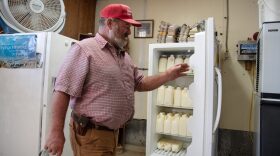In a debrief this week with The Colorado Sun, Sun editor Lance Benzel and KUNC host Dylan Simard discuss a recent government-led roundup of wild horses in Colorado that was a bit different from past roundups.
The wild horse roundup that began last week and wrapped up Tuesday was the first roundup of the year so far, and it was unique in scale. While roundups typically thin out a herd, this time around the U.S. Bureau of Land Management removed an entire herd, about 122 horses, from a rugged stretch of western Colorado known as the West Douglas Herd Area.
It all happened during an eight-day operation in which a helicopter drove the horses into holding pens. They were then transported to a facility in Cañon City.
Now, aerial surveys by the BLM show that zero horses remain in the area, which covers 128,000 acres—or about 200 square miles—of sagebrush, ravines and canyons.
"We've seen past roundups where herds were thinned out, but it's much rarer to see an entire herd displaced," Benzel said.
The BLM said the threat of horses starving during times of drought and causing ecological damage to the land easily justified the roundup—points that wild horse advocates dispute.
The roundup cost $187,000 not including the expenses of transporting and caring for the animals.
"Basically, BLM says that in drought years there is little water for the animals to drink, creating a grave risk of starvation," Benzel said. "They also say many horses have moved onto private land, which is causing trouble."
The move drew condemnation from wild horse advocates, who called the roundup inhumane and unnecessary. The American Wild Horse Campaign, a national nonprofit, has pushed to ban helicopter roundups altogether. According to Benzel, the organization contends the BLM's claims about wild horses aren't backed by evidence.
"They say there was no 'wild horse emergency,' and that horses die off naturally during Colorado's harsh winters," Benzel said of the nonprofit's stance on the matter.
The group also claims only about 3% of the 128,000 acres the horses were rounded up from is private land, leaving more than 1,000 acres for each horse that once roamed the lands. The American Wild Horse Campaign has called the roundups a "blunt force approach" to get rid of a herd the BLM doesn't want to manage, pointing out that four horses died during the roundups. The BLM said those deaths were the result of pre-existing health problems.
Post-roundup, the horses will spend a few weeks or months in holding pens on the grounds of a state prison in Cañon City. Then, the horses will either be transferred to a long-term pasture for them to live in more permanently or be put up for adoption. In the past, however, horses from the West Douglas herd have not been as popular at adoption events because the horses are smaller than domestic horses.
It's unlikely the debate over wild horse removal is going to resolve any time soon. The BLM removed over 30,000 horses in 2021 and 2022 from rangelands across the West, including about 1,500 in Colorado. This year, the agency plans to remove about 6,000 horses nationwide.






